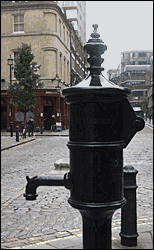
|
Podcast

|
Maturity
Encouragement
Good News
Church
Communion
Prayer
Christian Symbols
Scholarly Articles
Miscellany

|
Easter
Thanksgiving
Pentecost
Stations of the Cross

|
New Testament
Gospels
Acts
Paul's Letters
General Letters
Revelation
Topical Studies

|
Bible Studies
Articles
Books
Podcasts
Search
Menu
Donate
About Us
FAQ
Contact Us
Site Map
Take the Handle Off the Broad Street Pump
by Dr. Ralph F. Wilson
 In 1854, London was stricken with a devastating cholera epidemic. No one knew the cause of the disease. Panic was widespread.
In 1854, London was stricken with a devastating cholera epidemic. No one knew the cause of the disease. Panic was widespread.
Dr. John Snow, studying the deaths of 89 people in one week in the Soho district of the city, discovered that all but two of the victims drank from the Broad Street well. When asked his advice in an emergency meeting of concerned leaders, Snow suggested, "Take the handle off the Broad Street pump." It was done and the epidemic in that quarter of the city ceased.1
But removing the pump handle didn't solve the fundamental problem. Sewage was seeping into the well, poisoning it. The well must be protected from contamination to secure a safe water supply for the future.
The Bible pictures the heart as a spring or well. Proverbs 4:23 exhorts us,
"Above all else, guard your heart,
for it is the wellspring of life." (NIV)"Keep2 your heart with all vigilance,3
for from it flow the springs4 of life." (NRSV)
Guard your heart, because sewage in your heart will poison your whole life.
We must be continually on our guard against the subtle spiritual sewage that would trickle in and pollute. A hurt, an offense, can fill us with bitterness. At some points in my life I've found myself having to bail anger and resentment out of my heart several times a day so it doesn't turn to bitterness in my heart.
But other things pollute the heart, too. A hint of gossip can finish a friendship. A repeated sin can plunge us into the depression of guilt. A frantic busyness or the laziness of leisure can dull the heart with apathy toward God.
We have all met people whose spiritual lives have been sidetracked and crippled by failing to guard their hearts diligently. It could easily happen to us.
How then are we to guard our hearts? Several principles are essential.
- We must confess sin just as soon as the Holy Spirit convicts us. We cannot afford to allow it to filter into our hearts. We can receive God's cleansing immediately (1 John 1:9).
- We must refuse to harbor a grudge. Jesus teaches that immediate forgiveness and reconciliation are mandatory for His disciples (Matthew 5:23-24; Mark 11:25). To delay is to invite bitterness within.
- We must be quick to humble ourselves. Humility never hurts relationships; pride always does. Pride barricades the heart against God's voice.
- We must turn away wrong thoughts at the door. Martin Luther once said, "You can't stop a bird from flying over your head, but you can stop it from making a nest in your hair." We may not be able to prevent evil thoughts, but we are under no obligation to nurture them. We must test our thoughts by God's Word. If we let seeds of unbelief, lust, or sin linger to germinate, we reap their grim harvest of an enfeebled faith. Paul tells us rather to turn our thoughts to what builds us up — "think about these things" (Philippians 4:8)
- We must fellowship with God's people in order to keep our well sweet. There is a cleansing, renewing effect from the encouragement and lifting faith of other Christians (Hebrews 10:24-25).
Is Christ in your heart? Are you forcing Him to live among filth? If will allow Him, He will help you cleanse your heart. As we live as Jesus' disciples, we will guard our hearts with all diligence from anything that will prevent them from being places fit for the King.
1. More about this
cholera epidemic and
Dr. John Snow,
the father of epidemiology, can be found on Wikipedia.
2. "Guard" (NIV), "keep" (NRSV, KJV) is nāṣar, "watch, guard, keep."
(Walter C. Kaiser, TWOT #1407).
3. "Above all else" (NIV), "diligence" (KJV), "vigilance" (NRSV) is mishmār,
"place of confinement, jail, prison," late, "guard, watch, observance." The
basic idea of the root shāmar is "to exercise great care over", a synonym
of nāṣar used in the same phrase. (BDB 103).
4. "Wellspring" (NIV), "springs" (NRSV), "issues" (KJV) is toṣāʾot,
"exits" (from a city), here "starting-point" (of life) (Holladay, Lexicon,
p. 388), from yāṣāʾ, "go out, come out, go forth" (Paul R. Gilchrist,
TWOT #893).
Copyright © 2026, Ralph F. Wilson. <pastor![]() joyfulheart.com> All rights reserved. A single copy of this article is free. Do not put this on a website. See legal, copyright, and reprint information.
joyfulheart.com> All rights reserved. A single copy of this article is free. Do not put this on a website. See legal, copyright, and reprint information.

 To be notified about future articles, stories, and Bible studies, why don't you subscribe to our free newsletter, The Joyful Heart, by placing your e-mail address in the box below. We respect your
To be notified about future articles, stories, and Bible studies, why don't you subscribe to our free newsletter, The Joyful Heart, by placing your e-mail address in the box below. We respect your